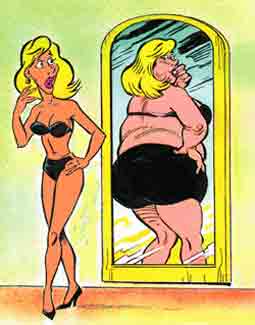catoptric system
(s) (noun), catoptric systems
(pl)
An optical setup in which images are produced by curved-surface mirrors: In the Fun Zone at the circus, Hayden's family saw a couple of catoptric systems which distorted the looks of their bodies making them look either very tall, very short, very fat, or very skinny, etc.
catoptric, katoptric
(adjective), more catoptric, more katoptric; most catoptric, more katoptric
1. Relating to reflected light: The grand ballroom was illuminated by the most creative system of catoptric illuminations imaginable.
2. Relating to or involving a mirror or reflection: Barbara admired her catoptric image on the surface of the lake as she looked down from a bridge.
3. Describing an optical arrangement that operates only by reflection: Telescopes, like those used in observatories, operate with a catoptric positioning of mirrors.
catoptrical, katoptrical
(adjective); more catoptrical, more katoptrical; most catoptrical, most katoptrical
1. Of or relating to looking glasses: Matthew was impressed with the wide choices of catoptrical reflections available in the department store.
2. Produced by or based on mirrors: Catoptrical images are related to exact likenesses which are a part of the science of optics, which involve the properties of light and vision.
catoptrically
(adverb), more catoptrically, most catoptrically
Relating to the reflections existing in mirrors: How often do people catoptrically see themselves in the morning as they prepare themselves for their daily activities?
catoptrics
(pl) (noun) (used as a singular)
1. The study of the physics of light reflection: At the local university, there is a department devoted to catoptrics which studies optical systems that function by properties of light and vision.
2. A branch of optics involved with the formation of images by speculums or polished metals: Dr. Tweedie, the physics professor, lectured about catoptrics which involved how images are produced by curved-suface mirrors.
catoptromancy, catoxtromancy, cattobomancy, catoptomancy
(s) (noun); catoptromancies; catoxtromancies; cattobomancies; catoptomancies
(pl)
Divination with a crystal ball, a lens, mirrors, or other reflective surfaces: At the fortune teller's booth, Mildred, the costumed woman, sat with a crystal ball, ready to practice her
catoptromancy when requested.
The Greeks put metal "mirrors" under the water or held them in a fountain and interpreted the reflections with catoptromancy.
Predictions of catoptromancies were also made by using a glass which was suspended over a holy well. The images on the glass supposedly "revealed" the secrets hidden in the water.
Catoptromancy also included divination based on how a face appeared when it was seen in a "looking glass" underwater.
catoptromania
(s) (noun), catoptromanias
(pl)
An abnormal fondness for, or a compulsion, to use a looking glass or mirrors: Mildred's
catoptromania compelled her to use every opportunity to look at herself in the looking glass that she carried in her purse or had in all of her rooms where she lived.
The proud queen walked from room to room, each of which contained one or more cheval glasses, and her abnormal catoptromania included the constant checking of her hair, her make-up, the clothes she was wearing, etc.
catoptromantic
(adjective), more catoptromantic, most catoptromantic
A reference to divination by means of a mirror or looking glasses: Susan, the fortune teller, utilized the catoptromantic environment that she had in her studio to predict the future for her customers.
catoptron
(s) (noun), catoptrons
(pl)
A reflecting optical glass, mirror, or instrument: Mildred got a carpenter to mount the large catoptron on the wall above the fireplace so it could reflect her collection of beautifully colored drinking glasses on the shelves across the room.
catoptrophobia, enoptrophobia
(s) (noun) (no plural)
An excessive fright of mirrors that may be based on ancient apprehensions and superstitions about reflections: Sam realized that he had developed
catoptrophobia or
enoptrophobia and couldn't tolerate having any reflecting surfaces in his home.
The earliest known looking glasses were the quiet waters of pools or ponds. Primitives believed that when they saw their own images in pools, or in any other reflective surfaces, they didn't just see an exact likeness of themselves, but their own souls looking back at them.
In the past, "catoptromancy", or mirror divination, was practiced and so it might have caused people to have catoptrophobia.

Some people who have catoptrophobia are afraid of looking in mirrors because they may see themselves with physical conditions or appearances that are not realistic.
catoptroscope
(s) (noun), catoptroscopes
(pl)
An instrument used to examine objects by means of reflected light: One surgeon claimed that he used a catoptroscope as he prepared to perform micro-surgery so he could make a better internal examination.
Related "mirror" word families:
eisoptro-;
enoptro;
mirac-, mir-.

